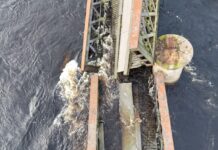
SCOTLAND is leading the way in the UK when it comes to embracing the Passivhaus international building standard – particularly in the education sector.
That’s the view of Sarah Lewis, research and policy director at the Passivhaus Trust. The organisation is hosting the UK Passivhaus Conference in Edinburgh from October 16-17, which brings together the Passivhaus community to network, share technical knowledge, demonstrate that Passivhaus is achievable, and help policy makers and the construction industry explore how to develop a ‘Scottish equivalent to Passivhaus’ policy and upscale the standard.
The event aims to build on plans announced earlier this year by the Scottish Government to introduce new minimum environmental design standards for all new build housing. Patrick Harvie MSP, Scotland’s minister for zero carbon buildings, will be a keynote speaker at the event, where he will share updates on how the policy is developing.
“We’re seeing a really positive and can-do response from the industry,” Sarah Lewis told Project Scotland. “The fact that around 35 Passivhaus schools are underway in Scotland has led to a shift in the industry as more and more companies get on board and are finding it’s an achievable high quality building standard. The schools programme has demonstrated that forward-thinking companies have been quickly able to adapt to Passivhaus requirements.”
Sarah praised the ‘innovative’ funding model from the Scottish Futures Trust for schools, which has encouraged the use of Passivhaus thanks to the requirement for projects to meet a very clear energy target, that has to be backed up by building post-occupancy monitoring. While the exact details of a ‘Scottish equivalent to Passivhaus’ are still being finalised, Sarah added that the Passivhaus Trust is ‘thrilled’ that the Scottish Government has committed to bringing forward a bill requiring higher energy efficiency standard in domestic building.
“As well as providing energy security and reduced heating bills, an enhanced Scottish Building Standard offers a chance to also improve occupant comfort and indoor air quality,” Sarah stated. “It is a truly forward-thinking approach by the Scottish Government and a positive response to the 2021 Scottish Climate Assembly recommendations.
“They are to be applauded for taking this crucial step towards meeting their net zero/climate emergency goals. For the next steps, it is imperative that the bill is well developed and implemented to deliver the greatest impact on the actual performance of new homes in Scotland.”
The UK Passivhaus Conference, being held both in person at The University of Edinburgh’s McEwan Hall, and online, will showcase a number of pioneering Passivhaus projects in Scotland including:
• Fife Council’s 23,000m2 Dunfermline Learning Campus
• Midlothian Council’s social housing programme, targeting 182 Passivhaus council homes
• The City of Edinburgh Council’s Passivhaus schools programme, for both new build and retrofit
• And Perth & Kinross Council’s recently completed Riverside Primary School
Sarah believes these projects are evidence that construction businesses are embracing Passivhaus, seeing it as both a business opportunity and a chance to demonstrate quality standards, delivering buildings that perform as designed.
The conference will also provide an opportunity to dispel some common misconceptions around Passivhaus.
“There are a range of misconceptions, from not being able to open the windows to design inflexibility, which can usually easily be dispelled by visiting a Passivhaus project,” Sarah added. “That’s why it’s great we have site tours as part of the conference, as well as the International Passivhaus Open Days coming up in November, which we’d strongly recommend the Passivhaus curious to attend!”
As Passivhaus becomes more mainstream, the importance of training construction personnel in ‘green’ skills will become increasingly important. Sarah paid tribute to the work of BEST-ST (Built Environment – Smarter Transformation), which offers Scotland’s first national Passivhaus, retrofit and fabric first training programme as part of its mission to accelerate the built environment’s transition to zero carbon emissions.
The Passivhaus Trust has a strategic partnership with BE-ST to support the delivery of Passivhaus training. Sarah said, “BE-ST offers a range of training courses including its Low Carbon Learning programme, which provides Passivhaus, retrofit and fabric first training funded by Scottish Funding Council and Skills Development Scotland through the Transition Training Fund. To date, BE-ST’s Low Carbon Learning programme has supported 2,500+ individuals through Passivhaus standards and retrofit training, 388 of which have been trained face-to-face. Low Carbon Learning also delivers Passivhaus training via e-learning and online workshops.”
The Passivhaus Trust is an independent non-profit organisation founded in 2010 that provides UK-wide leadership for the adoption of the international Passivhaus standard and methodology. Sarah said that, over the last 13 years, the organisation has found that every UK Passivhaus project has a ‘multiplier’ effect, resulting in ‘exponential growth’ of the standard.
“It was fantastic that in the Scottish Climate Assembly’s 2021 recommendations for action, 97% of the Assembly voted in favour of the Passivhaus or Scottish equivalent standard for new build projects in Scotland,” Sarah concluded. “For Passivhaus to be acknowledged in the Scottish Parliament and for a ‘Scottish equivalent to Passivhaus’ to potentially become part of Scottish policy is exactly the sort of gear change we’ve been working towards.”








